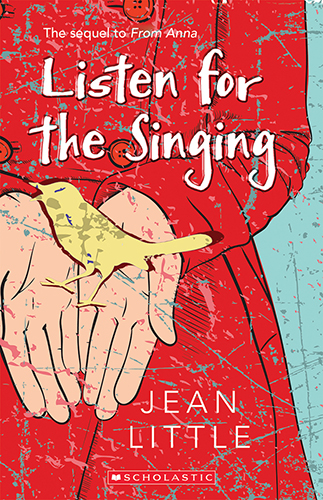| ________________
CM . . .
. Volume XXIV Number 12. . . November 24, 2017
excerpt:
First published in 1977, Jean Little's novel, Listen for the Singing, is especially relevant today. In her earlier novel, From Anna, (1972) readers met a visually impaired German girl, Anna Solden, whose family moved to Toronto just after Hitler's rise to power. The Depression of the 1930s adds to Anna's troubles, but a teacher's kindness makes a difference in her life. Although Listen for the Singing continues the story of Anna coping with her disability, it is a stand-alone novel about being part of a disliked ethnic minority. It opens in September 1939, not only the start of Anna's high school years, but also the beginning of war between Canada and Germany. Little shows how a community (in this case, a high school) can take the high road and be a bastion of acceptance and understanding in a situation where some members are viewed with hostility and suspicion because of their national origins. Mr. Appleby, Anna's high school principal, quoted at the beginning of this review, sets the tone and sends a message at the opening day assembly where he draws positive attention to the Solden children, noting that Anna's eldest brother, Rudi, came to Canada in 1934 speaking very little English and is now studying at the University of Toronto. He praises the other Solden children, then addresses Anna, somewhere in the auditorium, saying, "Remember that I'm here to help you in any way I can. That goes for every new student beginning here this morning." Two confident students, the children of a school board member and a city councillor, draw attention to their own German ancestry when a teacher tries to bully Anna because she is German-born. Through them, Little shows the importance of supporting people who are being treated unfairly. Many characters are kind and welcoming, such as the three girls who accept Anna into their circle. Little also shows the importance of a loving family in facing adversity. In From Anna, the older children frequently were impatient with Anna because her poor vision made it hard for her to keep up. In Listen for the Singing, her siblings, now more mature, show her more understanding. One of her sisters guides her through her first day of high school, and her eldest brother arranges for her to have her hair done in an up-to-date style for a school dance. In some young adult novels, the protagonist is provided with a "love interest", but in this one, Anna is focused entirely on her girlfriends at school and on her family. Because Jean Little has been legally blind since early childhood, she excels in creating convincing characters who have disabilities. Anna's concerns about fitting in at school and making a good impression are shared by all young people starting high school, no matter what their abilities are. Her feelings struck a chord with this reviewer. Listen for the Singing is valuable, as well, in quietly educating readers about the early Nazi period in Germany. Mr. Solden, a former English literature professor in Frankfurt, seized the chance to get his family out in 1934 when a Canadian relative left him a small grocery store and a house in Toronto. Meanwhile, his sister Tania, who married into a Jewish family, sends cryptic letters that hint of oppression, and then she falls silent. Rudi Solden struggles with his shame at being German and his concern for his friends back in Frankfurt. Rudi, who is present throughout the novel, becomes the focus of attention in the last quarter of the book. The last chapters add to the family solidarity theme, but Rudi's significant experience, which parallels a pre-existing situation in the story, seems contrived. Generally, however, Listen for the Singing is an outstanding novel, not only well-written, but also highly relevant in a multicultural society with "differently abled" members. Its unobtrusive moral message, that we should extend a hand, not a finger, to our neighbours, is one to take to heart. Highly Recommended. Ruth Latta's most recent novel is Grace and the Secret Vault, available through info@baico.ca and ruthlatta1@gmail.com.
To comment
on this title or this review, send mail to cm@umanitoba.ca.
This Creative Commons license allows you to download the review and share it with others as long
as you credit the CM Association. You cannot change the review in any way or use it commercially. Commercial use is available through a contract with the CM Association. This Creative Commons license allows publishers whose works are being reviewed to download and share said CM reviews provided you credit the CM Association.
Next Review | Table of Contents For This Issue - November 24, 2017 |
